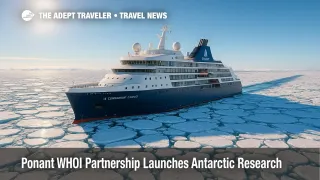Ponant WHOI partnership launches Antarctic research

Ponant Explorations Group is partnering with the Woods Hole Oceanographic Institution in a first-of-its-kind collaboration for WHOI. The three-year program embeds scientists on select expedition cruises, beginning with an October 31 voyage in Antarctica focused on emperor penguins. Guests will see lab work, attend talks, and learn how field research informs climate science and conservation.
Key points
- Why it matters: Adds credible science to expedition cruise travel with WHOI onboard.
- Travel impact: Guests can observe research, labs, and lectures during select sailings.
- What's next: Further WHOI sailings, tech trials, and at-sea education will roll out.
- Le Commandant Charcot will host October 31 emperor penguin research.
- WHOI's Dr. Catherine Walker will guide graduate researchers on the voyage.
Snapshot
Under the Ponant WHOI partnership, scientists will join select expeditions to conduct fieldwork and share findings with travelers. The inaugural sailing departs October 31 on The Emperor Penguins of the Weddell Sea itinerary aboard the PC-2 rated Le Commandant Charcot. WHOI-MIT Joint Program students Caroline Needell and Bailey Fluegel will work with WHOI glaciologist Dr. Catherine Walker to study ice-ocean dynamics near emperor penguin habitat. Programming includes guest access to wet and dry labs and expert presentations on Antarctic geology, climate relevance, and fragile ecosystems. For most travelers, the gateway is Ushuaia via Arturo Merino Benítez International Airport (SCL) and Malvinas Argentinas International Airport (USH), with air and transfers bundled on this departure.
Background
WHOI is the world's largest independent ocean science organization and a leading developer of polar research methods. Ponant Explorations Group operates small ships ranging from four to 165 staterooms and suites, including the ice-capable Le Commandant Charcot. Since 2021, Ponant has hosted more than 230 scientists across its fleet. This formal partnership extends that practice with a defined three-year framework for research access, technology testing, and public education at sea. The initial Antarctica sailing emphasizes emperor penguin ecosystems and ice-ocean interactions that influence sea level projections. Onboard LiDAR will help model ice cliff geometry and breakup rates, data that is difficult to capture by satellite alone.
Latest developments
First expedition sets sail October 31 with labs open to guests
Ponant confirms the first WHOI expedition departs October 31, 2025, round-trip Ushuaia, on The Emperor Penguins of the Weddell Sea itinerary aboard Le Commandant Charcot. WHOI-MIT Joint Program graduate students Caroline Needell and Bailey Fluegel will deploy LiDAR to measure ice features linked to stability, under the guidance of Dr. Catherine Walker, an associate scientist known for work on Antarctic coastal change and ice shelf rifting. The PC-2 ship enables close approaches through heavy sea ice when conditions allow. Guests can observe field methods, visit onboard labs, and attend lectures connecting site observations to global climate, with additional WHOI voyages and programs to be announced.
Analysis
For expedition cruise travelers, the Ponant WHOI partnership adds depth and credibility to polar travel by integrating active research with guest education. WHOI's presence signals rigorous scientific goals, while Ponant's PC-2 capability increases the likelihood of reaching hard-to-access fast ice, where emperor penguins and critical ice features are found. The inclusion of LiDAR is notable. Collecting precise ice cliff geometry in situ can refine models of ice shelf stability, an area that strongly influences sea level scenarios. From a trip-planning perspective, this is not a typical sightseeing cruise. Conditions dictate routing, and programming centers on science and conservation. Travelers should expect flexible daily plans, variable wildlife encounters, and structured lab access with clear protocols. The upside is meaningful engagement, expert interpretation, and a rare window into how polar data is gathered. As more WHOI sailings are announced, expect similar formats in other remote regions, with technology trials and talks designed to translate complex research into traveler-friendly learning.
Final thoughts
The Ponant WHOI partnership blends expedition cruising with frontline research, giving travelers a clear line of sight from ice measurements to climate understanding. With emperor penguins as the seasonal focus and labs open to guests, the October 31 voyage previews how future sailings could pair discovery with stewardship. For travelers who value education, conservation, and small-ship access to remote ice, this collaboration makes a compelling case to choose an expedition anchored by the Ponant WHOI partnership.
Sources
- PONANT Explorations Group announces new partnership with Woods Hole Oceanographic Institution, WHOI press release, October 9, 2025
- PONANT Explorations Group announces partnership with WHOI, Ponant Americas press page
- The Emperor Penguins of Weddell Sea, Ponant voyage page, Oct 31-Nov 12, 2025
- Catherine Walker, WHOI profile
- Bailey Fluegel, WHOI profile
- MIT-WHOI Joint Program, G&G students directory listing Caroline Needell, WHOI
